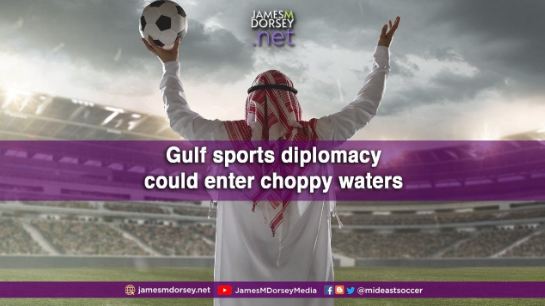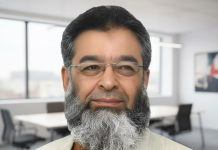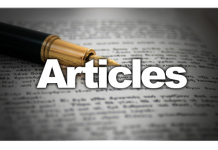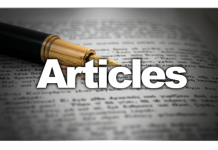Storm clouds may be gathering, potentially casting a shadow over Saudi Arabia’s shock-and-awe sports buying spree and complicating the geopolitical and geoeconomic sports strategies of the United Arab Emirates and Qatar.
So far, it’s been smooth sailing for autocratic Gulf states. Despite a decade of fierce criticism and a UAE-Saudi-led boycott, even Qatar turned its successful hosting of the 2022 World Cup to its advantage.
That could be changing. A combination of embarrassing disclosures, calls for restricting foreign state ownership of soccer clubs, regulator’s curbing of Gulf state ambitions, competition among the Gulf states, legal challenges to Gulf funding, and fan protests suggests trouble could be brewing.
Looming largest, leading Premier League clubs have asked the government, in advance of the creation of an independent football regulator, to block nation-states from owning soccer teams.
The regulator is expected to assess the suitability of prospective owners and directors, emphasizing the ‘ethics and integrity’ component of the testing.
It was not immediately clear whether the eligibility assessment would be retroactive, potentially challenging the UAE’s ownership of Manchester City, a Qatari bid for Manchester United, and Saudi Arabia’s 2021 acquisition of Newcastle United.
Ownership of Newcastle by Saudi Arabia’s sovereign wealth fund, the Public Investment Fund (PIF), could prove to be the most vulnerable.
Some Premier League teams suggest the League’s assertion that the kingdom’s ‘legally binding assurances’ that it would not control the club have since been contradicted in court filings in the United States.
In the filings, Saudi Arabia described the Public Investment Fund as a “sovereign instrumentality of the Kingdom of Saudi Arabia” and Yasir al-Rumayyan, Newcastle’s chairman and the Fund’s governor, as “a sitting minister of the Saudi government.”
A British government briefing paper on the independent regulator appeared to hedge its bets.
The government said it was designing the eligibility test with “trade-offs involved” and taking note of “the range of corporate structures behind clubs, including complex ownership structures, private equity and funds, sovereign wealth funds, and fan-owned clubs.”
In addition, the government said that “the regulator would not be able to make unilateral judgments that risk straying into foreign policy.” Government officials have sometimes defined Gulf state acquisitions as crucial to Britain’s relationships.
The eligibility test raises whether similar assessments should be applied in other sectors, particularly the media, with Qatari and Emirati investors eyeing the acquisition of stakes in the Telegraph Media Group, publisher of Britain’s venerable conservative newspaper, the Telegraph.
Saudi Arabia’s 2019 acquisition of a 30 per cent stake in The Independent may serve as a warning sign. The liberal British online publication lent its brand to Saudi-controlled Arabic, Farsi, Urdu, and Turkish-language news websites operating under the kingdom’s strict censorship and repression of freedom of expression and the media.
Saudi restrictions were displayed this weekend when Saudi Arabia lost a poorly attended friendly match against Costa Rica in Newcastle’s stadium. In a break with tradition, the Saudi sports ministry banned Saudi coach Roberto Mancini and national team players from speaking to the media after the match.
Before the game, a Newcastle supporters’ group staged a protest against using the historic ground by the Saudi national team. The NUFC Fans Against Sportswashing group held posters of young men they said were on death row in the kingdom ‘for demonstrating.’
The group represents a minority of Newcastle supporters, most of whom appear to be concerned little about Saudi Arabia’s abominable human rights record.
Saudi dissident Lina al-Hathloul addressed the protesters. Fans can “both be happy about Newcastle winning and criticise what is happening in Saudi,” she said.
Ms. Al-Hathloul’s activist sister, Loujain, was arrested in 2018 and sentenced in 2020 to almost six years in prison for “inciting change to the basic ruling regime” and “serving a foreign agenda inside the kingdom by using the internet with the objective of damaging public order.”
She was released in 2021 but slapped with a five-year travel ban.
The effectiveness of the soccer eligibility test is likely to be complicated by Gulf states’ lack of a conflict-of-interest policy that allows government officials to pursue private business interests while serving the public.
The Saudi government’s relationship with Newcastle may be unambiguous. It gets murky with the UAE’s ownership of Manchester City and the Qatari bid for the club’s archrival.
Manchester City is owned by the City Football Group, a holding company in which Abu Dhabi United Group for Development and Investment (ADUG) has an 81 per cent stake. Mansour bin Zayed Al Nahyan controls the Abu Dhabi group. He is an Abu Dhabi ruling family member and UAE minister of presidential affairs.
Similarly, it is unclear whether Jassim bin Hamad Al Thani, chairman of Qatar Islamic Bank and son of a former prime minister, is personally interested in Manchester United or whether his US$9.15 bid for the club is part of a Qatari effort to expand its European franchise.
Britain’s eligibility test is one of several potential challenges to Gulf funding.
Spain’s top soccer league, La Liga, has complained to the European Commission that Qatari state aid to Qatar-owned Paris Saint-Germain (PSG) allegedly distorts European Union markets by paying above market sums for top players.
La Liga filed its complaint under newly enacted European Union foreign subsidies regulations. The rules empower the Commission to investigate funding by non-EU members of companies operating in Europe and “redress, if needed, their distortive effects.”
La Liga opened itself to allegations of hypocrisy by, at the same time, appointing Visit Saudi, the Saudi tourism marketing campaign, as its global sponsor.
How the Commission handles the complaint could have consequences for Saudi Arabia’s mouthwatering expenditure on soccer player acquisitions.
For US$875 million, the acquisitions netted the kingdom 15 foreign players, including superstars Cristiano Ronaldo, Karim Benzema, and Neymar. However, it failed to seduce Lionel Messi, who opted for Inter-Miami CF and did not secure Liverpool’s Mohamed Saleh before the transfer window closed.
La Liga’s complaint and the British eligibility test are not Qatar’s only post-World Cup headaches. A recent US court filing allegedly documents Qatar paying US$330 million to 14 executives of world soccer body FIFA in advance of awarding the 2022 World Cup to the Gulf state.
The UAE, the Middle East’s Teflon state, also faces embarrassing allegations.
Muckraking Norwegian soccer magazine Josimar asserted in a lengthy investigation that Manchester City’s long-standing Direct Selling Partner, Qnet, has been implicated in African human trafficking inquiries involving an alleged Ponzi scheme. Qnet and Manchester City denied the allegations.
Adding to potential Gulf headaches is an emerging competition between Gulf states, particularly Saudi Arabia and Qatar.
The Confederation of African Football (CAF) reportedly annulled Qatar’s beIN network’s rights to broadcast interviews with African national teams and clubs after agreeing with beIN’s rival, Saudi Sports Company (SSC).
At about the same time, beIN Media chairman Nasser Al-Khelaifi, as chairman of the European Club Association (ECA), ruled out a Saudi club’s participation in a reformatted Champions League, Europe’s top soccer competition.
“I don’t know what is going to happen in a few years, but today, I don’t see that anyone from outside will play here,” Mr. Al-Khelaifi said.
Mr. Al-Khelaifi also chairs the Qatar Investment Authority’s subsidiary, Qatar Sports Investments (QSI), and is president of Paris Saint-Germain.
Talking about Saudi Arabia, Peter Frankental, Amnesty International’s economic affairs programme director, warned, “Sportswashing is affecting numerous sports, and governing bodies need to respond to it far more effectively.”
Dr. James M. Dorsey is an Honorary Fellow at Singapore’s Middle East Institute-NUS, an Adjunct Senior Fellow at Nanyang Technological University’s S. Rajaratnam School of International Studies, and the author of the syndicated column and podcast, The Turbulent World with James M. Dorsey.
















